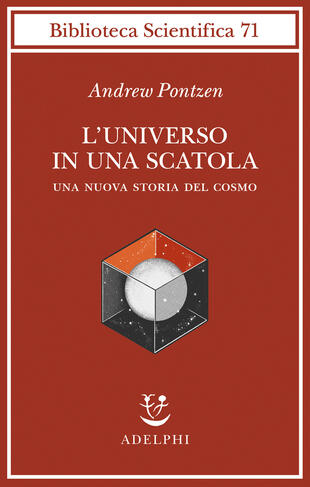

Sinossi
«L'universo non cambia molto nell'arco di una vita umana, ciò che sappiamo dell'universo invece sì». Di questo adagio è un esempio eclatante la vicenda biografica di Pontzen, che, irresistibilmente attratto dall'astronomia sin dall'infanzia, è oggi uno degli specialisti più autorevoli nel campo delle «simulazioni» cosmologiche, elaborate con supercomputer sempre più sofisticati. Muovendo dalla inattesa e sorprendente continuità tra «proiezioni» meteorologiche e cosmologiche, Pontzen ci guida lungo le tappe cruciali della scienza previsionale: ci porta per esempio nell'«imponente edificio in arenaria rossa» dello Smithsonian Institution, «il Castello» neogotico di metà Ottocento dove il direttore, Joseph Henry, deliziava gli ospiti predicendo i temporali su Washington. E illumina, attraverso quelle stazioni di avvicinamento, ogni risvolto delle simulazioni cosmologiche in corso: l'avanguardia delle macchine (delle «scatole»), tra inedita potenza di calcolo, risoluzione sempre più alta e miglior conoscenza delle «condizioni iniziali»; la «ricetta eclettica» sottostante a ogni ricerca («parti uguali di fisica consolidata, trucchi computazionali e adattamento a ciò che è già noto»); e, soprattutto, il modo in cui vengono ridefinite «sostanze» elusive come la materia e l'energia «oscure», responsabili rispettivamente della rotazione delle galassie e dell'espansione dell'universo, al punto da risultare centrali nella «storia» qui delineata. Quella storia, cioè, «che unisce i puntini tra i primi istanti dell'universo, la ragnatela cosmica dalle dimensioni inimmaginabili, e le galassie, le stelle e i pianeti che la abitano».
- ISBN: 8845938611
- Casa Editrice: Adelphi
- Pagine: 282
- Data di uscita: 09-02-2024
Recensioni
The box of the title is a computer, and the book is about the progress made in modeling the largescale contents of the universe using computer simulations. I read a lot of astrophysics books when they come out, often through NetGalley. The field doesn't change that fast so there usually isn't too muc Leggi tutto
The computer is playing an increasingly important role in our understanding of the universe. This book provides a popularized review of the use of computer simulations in astrophysics and what the simulations can (or cannot) tell us about the universe. The book also deals with the historical develop Leggi tutto
Fills the Bill on Physics Modelling and Progress - Since reading Hertog’s “On the Origin of Time: Stephen Hawking's Final Theory” (see my review), I was interested in learning more about the use of simulations in cosmology and physics. This books certainly fills the bill giving background and progre Leggi tutto
This guy sciences
In humanity's relentless pursuit to comprehend the cosmos, we've journeyed from the realm of myths and mysticism to the structured methodologies and equations of pre-technology science. Moving away from arbitrary assumptions to empirical observations and logical reasoning was a fascinating and compr Leggi tutto
Really enjoyed this, always interesting to consider the balance of efficiency to veracity in computer simulations and beyond. I’d say there’s a little repetition but lots of well explained and concise ideas 💡
A simulation by definition is a simplification of the thing it simulates. The map is not the territory. And almost all successful simulations are built with nudges and constraints that limit and direct what the simulation does in ways that go beyond defining initial conditions and rules for developm Leggi tutto
The book was quite an enjoyable read into the many theoretical aspects that go into designing simulations. The historical portions were well written and flowed well. The first four chapters were exceptional and are worthy, perhaps especially Chapter 2 on Dark Matter, Dark Energy and The Cosmic Web.
Citazioni
Al momento non ci sono citazioni, inserisci tu la prima!























